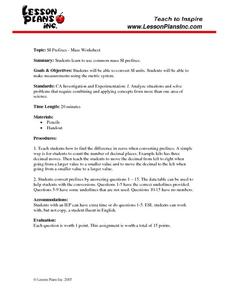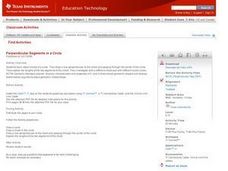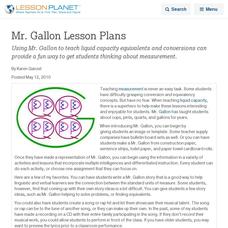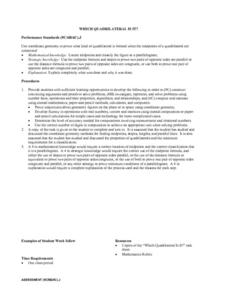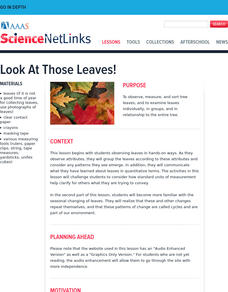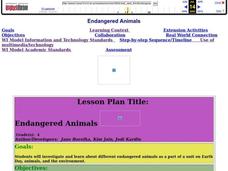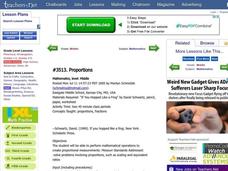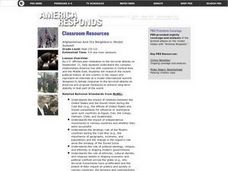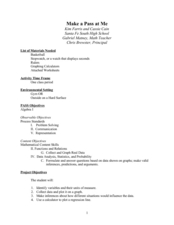Curated OER
Let's Do the Wave!
Students distinguish waves from matter, differentiate between transverse and longitudinal waves, use sine curves as representations of transverse waves, label characteristic properties of waves, diagram transverse waves having specific...
Curated OER
To Float or Not to Float, That is the Question?
Ninth graders develop operational definition of density, do computations using density equation, categorize pieces of matter as being able to float on
water or not, based on density, explain why some objects sink or float based on...
Curated OER
SI Prefixes and Mass
In this SI prefixes and mass learning exercise, students are given measurements of mass and they covert to the given measurement by moving the decimal the proper number of places to the left or right.
Curated OER
Pre History through Modern Day Timeline
Students explore the historical sequence of cultures throughout history. They demonstrate the ability to organize events in chronological order and demonstrate how time is measured and annotated.
Alabama Learning Exchange (ALEX)
Sonar Mapping of the Ocean Floor
Eighth graders participate in an experiment that emulates a sonar signal bouncing off the ocean floor. They determine how the ocean floor is measured by the length of time it takes for the sonar signal to return. They work with a wooden...
Curated OER
Perpendicular Segments in a Circle
High schoolers explore the concept of circles as they construct a circle using a program such as Cabri Jr. Learners construct a chord and a diameter that are perpendicular, then measure the bisected chord and notice that both sides of...
Texas Instruments
Investigating Segments in a Quadrilateral
Investigate the properties of the shape formed by connecting the midpoints of adjacent sides of a quadrilateral. In this properties of the shape formed by connecting the midpoints of adjacent sides of a quadrilateral lesson, young...
Curated OER
Mr. Gallon Lesson Plans
Using Mr. Gallon to teach liquid capacity equivalents and conversions can provide a fun way to get students thinking about measurement.
Curated OER
Whites, Blacks and the Blues
This lesson enables students to explore and measure the distance between blacks and whites in the past and present United States. By thinking about the intersections of whites, blacks, and others around the blues, students will deepen...
Curated OER
Which Quadrilateral Is It?
Young scholars prove conjectures about geometric figures on the plane or in space using coordinate geometry. They develop fluency in operations with real numbers, vectors and matrices using mental computation or paper-and-pencil...
Curated OER
Look At Those Leaves!
Students observe, measure, and sort tree leaves. They examine leaves individually, in groups, and in relationship to the entire tree. They become familiar with the seasonal changing of leaves. They realize that these and other changes...
Curated OER
Acceleration, Drag, Gravity, Motion, Forces, and Friction
Eighth graders build and run mousetrap cars in order to measure distance, time, and mass for their cars. They use these measurements to calculate average speed and kinetic energy, then create a slide show to visually explain how the car...
Curated OER
Angles Formed By Parallel Lines
Young scholars explore the concept of angles formed by parallel lines.They graph two parallel lines cut by a transversal, then measure the angles formed by the transversal and record the data in a table. Learners make conjectures about...
Curated OER
Endangered Animals
Fourth graders research different endangered animals in media center as part of unit on Earth Day, animals, and environment, create project based around multiple intelligence related to an endangered animal, and produce Powerpoint...
Curated OER
Proportions
Students perform mathematical operations to create proportional measurements, after listening to the David Schwartz book, If You Hopped Like a Frog.
Curated OER
Afghanistan and Its Neighbors: Model Summit
Students examine the relationship between the United States and the Soviet Union during the Cold War. They discover the role of religion and cultural identity in the war in Afghanistan. They explore the arguments for and and against...
Curated OER
Taming Terrorism
Students explore different organizations working to stop terrorism. They examine international summits and their recommendations. They participate in a debate about the effectiveness of the measures proposed.
Curated OER
Anything I Can Do You Can Do Better
Middle schoolers complete a two-week unit involving design and construction concepts. They watch a PowerPoint presentation about geometric shapes, draw the fourteen shapes incorporated in bridge construction, and in small groups design,...
Curated OER
Navigating by the Numbers
Students observe how math is important in navigation and engineering. They study how surveyors use math and science to calcute, count, measure, label, and indicate distances on a map. They estimate specific distances.
Curated OER
Volcanic Activity in the U.S.
Students locate and map ten volcanoes in United States, create chart comparing volcanoes by last eruption, type of volcano, location, and interesting fact, and create Powerpoint slide show describing basic
information about volcanoes and...
Curated OER
A Newspaper?
Sixth graders use newspapers to investigate fractions. They work in small groups to categorize articles, measure them with the grid transparency, and calculate the values represented. Afterward, they write a reflective essay on the role...
Curated OER
Make a Pass at Me
Learners identify different types of functions and units of measurements. In this statistics lesson plan, students will collect data, graph their data and make predictions about their data. They plot a linear regression graph.
Curated OER
Zoo Poo
Students use Internet research to determine the amount of carbon dioxide produced per unit energy for biomass and coal. In this alternative energy lesson, students research to find out how much energy and carbon dioxide several coal and...
Curated OER
Speed and Experiments
For this speed and experiments worksheet, students read about how to calculate the speed by using the change in distance divided by the change in time. They also read about experimental design and scientific method. Students match 5...




